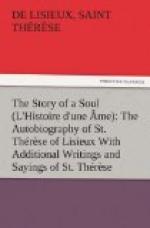In Venice the scene changed completely. Instead of the bustle of a large city, silence reigned, broken only by the lapping of the waters and the cries of the gondoliers as they plied their oars; it is a city full of charm but full of sadness. Even the Palace of the Doges, splendid though it be, is sad; we walked through halls whose vaulted roofs have long since ceased to re-echo the voices of the governors in their sentences of life and death. Its dark dungeons are no longer a living tomb for unfortunate prisoners to pine within.
While visiting these dreadful prisons I fancied myself in the times of the martyrs, and gladly would I have chosen this sombre abode for my dwelling if there had been any question of confessing my faith. Presently the guide’s voice roused me from my reverie, and I crossed the “Bridge of Sighs,” so called because of the sighs uttered by the wretched prisoners as they passed from their dungeons to sentence and to death. After leaving Venice we visited Padua and there venerated the relic of St. Anthony’s tongue; then Bologna, where St. Catherine’s body rests. Her face still bears the impress of the kiss bestowed on her by the Infant Jesus.
I was indeed happy when on the way to Loreto. Our Lady had chosen an ideal spot in which to place her Holy House. Everything is poor, simple, and primitive; the women still wear the graceful dress of the country and have not, as in the large towns, adopted the modern Paris fashions. I found Loreto enchanting. And what shall I say of the Holy House? I was overwhelmed with emotion when I realised that I was under the very roof that had sheltered the Holy Family. I gazed on the same walls Our Lord had looked on. I trod the ground once moistened with the sweat of St. Joseph’s toil, and saw the little chamber of the Annunciation, where the Blessed Virgin Mary held Jesus in her arms after she had borne Him there in her virginal womb. I even put my Rosary into the little porringer used by the Divine Child. How sweet those memories!
But our greatest joy was to receive Jesus in His own House, and thus become His living temple in the very place which He had honoured by His Divine Presence. According to Roman custom the Blessed Sacrament is reserved at one Altar in each Church, and there only is it given to the faithful. At Loreto this Altar was in the Basilica—which is built round the Holy House, enclosing it as a precious stone might be enclosed in a casket of white marble. The exterior mattered little to us, it was in the diamond itself that we wished to receive the Bread of Angels. My Father, with his habitual gentleness, followed the other pilgrims, but his daughters, less easily satisfied, went towards the Holy House.




